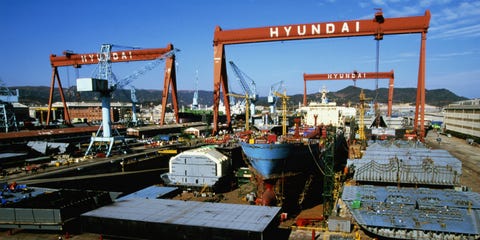
Paul Chesley/Getty Images
- Hyundai has temporarily shut down production at its three South Korea factories because it can’t get necessary parts from China due to coronavirus-related shutdowns there.
- China production from several auto companies, from BMW to Toyota, has been suspended as measures to contain the coronavirus continue to grow.
- Nobody knows how long the shutdowns will last or what the impact will be on supplies of vehicles for U.S. buyers.
Automakers and suppliers have shut down dozens of Chinese factories as the government attempts to contain the deadly coronavirus that has sickened thousands and killed hundreds.
The latest is Hyundai, which decided on Tuesday to shut down its three South Korea plants due to shortages of a wiring harness that was no longer available from a supplier in China, according to Korean broadcaster Arirang. Kia, the Financial Times reported today, is not affected yet. Hyundai’s Ulsan plant is the largest in the world, with an annual capacity of up to 1.6 million vehicles. These production shutdowns have already affected production of the new Palisade because of a lack of parts, Automotive News Europe reported.
BMW, Daimler, Ford, Honda, Nissan, Renault, Tesla, Toyota, and the Volkswagen Group have all suspended or halted production in China over the past week. Suppliers including Bosch are doing the same.
The shutdown isn’t exactly voluntary. Every foreign automaker and parts supplier must establish a 50/50 joint venture with a Chinese company—the majority of which are state sponsored or at least heavily connected to China’s government—in order to do business in China. The employee shutdown currently affects most workers in China across various occupations, as various provinces have decided to extend the Chinese New Year holiday—which ordinarily would have ended on January 29—to as long as February 9, according to Reuters. Some companies, among them Honda, are idling their plants for longer.
Bloomberg has noted the shutdowns may in fact be a necessary market correction against an oversupply of China-built cars. But the end result may be two-faced: If the shutdown lasts for several more weeks, automakers may pay dearly for these production losses if dropping inventories squeeze new-vehicle sales. Automakers like Volvo are also relying more exclusively on Chinese parts, such as spare tires, that may hurt production in other factories outside China.
Source: Motor - aranddriver.com


